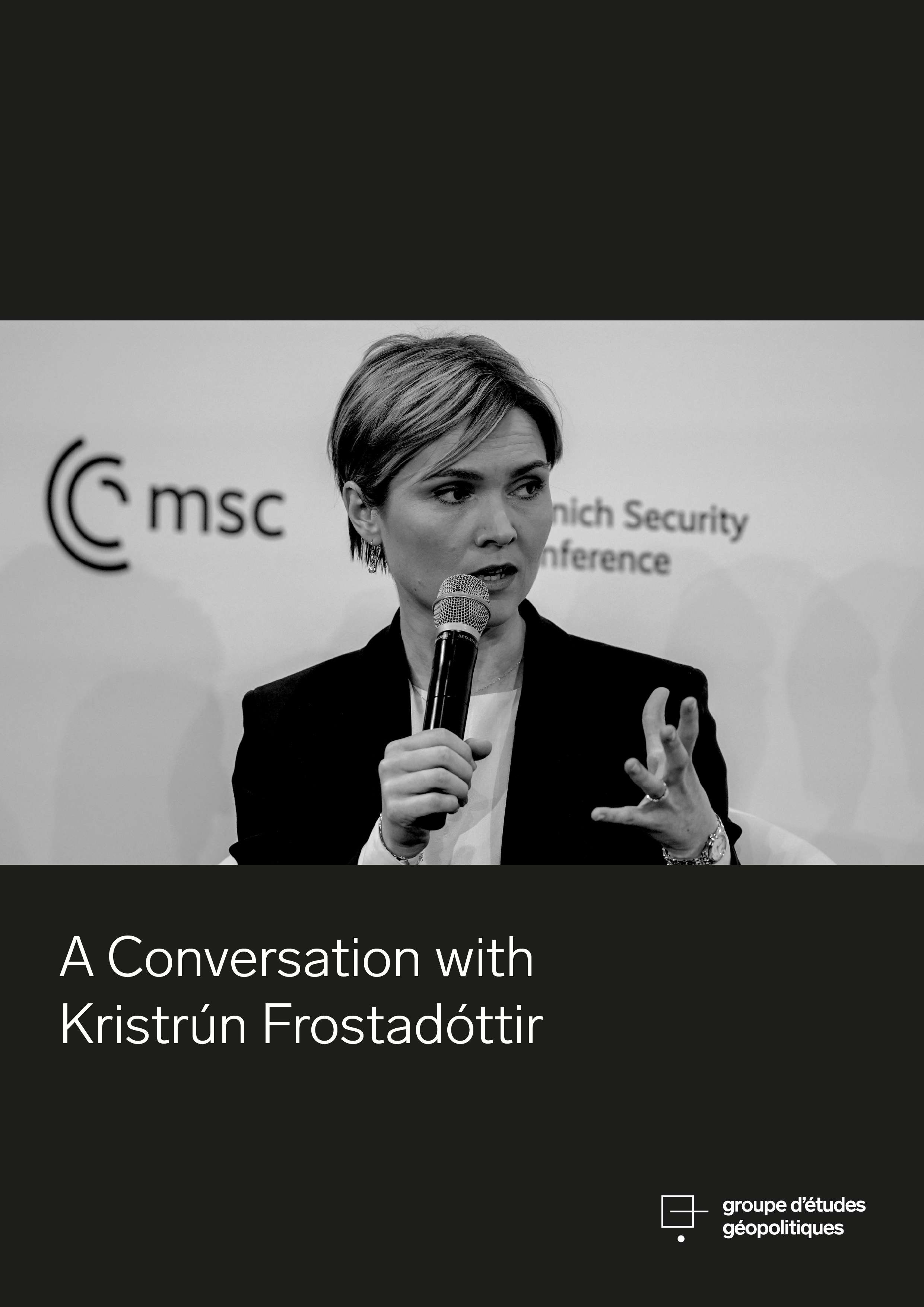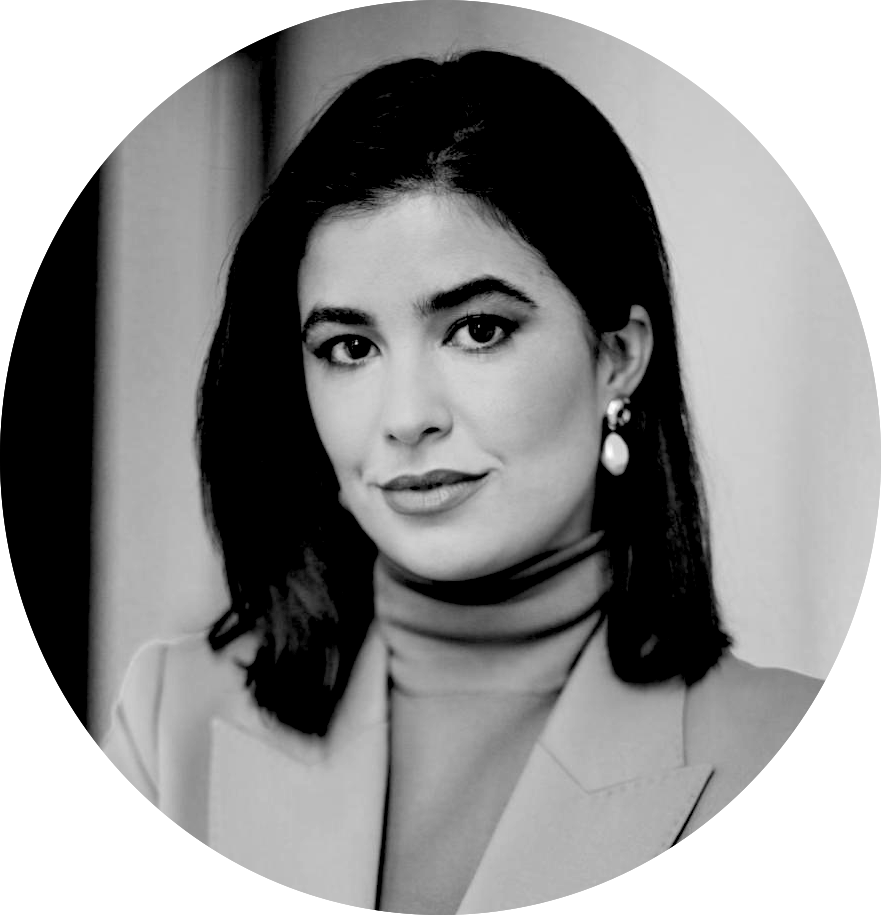A conversation with Kristrún Frostadóttir, Prime Minister of Iceland
Maria Tadeo
Grand Continent EU Correspondant21/02/2025

A conversation with Kristrún Frostadóttir, Prime Minister of Iceland

Maria Tadeo
Grand Continent EU Correspondant21/02/2025

 Voir tous les articles
Voir tous les articles
A conversation with Kristrún Frostadóttir, Prime Minister of Iceland
President Trump has put the Arctic, and Greenland in particular, in the spotlight, even suggesting that the US would consider taking over the territory of the world’s largest island. Do you take this threat at face value?
Our approach is to read everything in a productive and constructive way.
The world is now focused on the Arctic, which is positive. We are aware of the importance of the region in the global context. We want a peaceful Arctic and so do our Nordic neighbours. But it’s not just about security. We also need to talk about economic opportunities, whether in Greenland or Iceland. Rare earth minerals in Greenland and the routes around it can offer a positive economic discourse, one that is full of opportunities. This is the way we should go.
Iceland will always be a country that supports peace, and we have a strong connection with Greenland, not only because we are geographically close, but also because we used to be part of Denmark. We have been through a similar process. We know what it means to be a small country in the North Atlantic surrounded by bigger powers.
What I would say is that the future of Greenland depends on the people of Greenland and it is important to create economic opportunities for them. As I said, we will always support peace in the Arctic, but that also means social cohesion and opportunity.
If you believe that President Trump is not planning to take over Greenland, is this a way of signalling to China that the United States sees the Arctic as its sphere of influence and will keep it that way?
We are aware of this view. More and more countries are becoming more cautious when it comes to China, for example when it comes to foreign investment screening. We have a bilateral trade agreement with China, but we are also cautious.
We recognise that we are in a new environment and we are strong allies with the European Union, the United States and NATO. That will obviously be our focus.
You campaigned on a pro-EU platform and want to put the question of resuming accession talks to a referendum. This is a process that Iceland halted in 2013. How will your approach be different this time?
Iceland has some unique attributes, just from a geographical point of view we will always have a different relationship with the continent.
We are already part of the European Economic Area. Our biggest trade relationship is with Europe, our cultural heritage is with the Nordic countries. We have a special relationship with the US, of course, which we will continue to develop because it is necessary for us. The question now will be: do the Icelandic people want us to reopen negotiations with the EU?
It is important to give this discussion time, and that means a couple of years, also because in terms of domestic priorities our voters need to see that we can deliver on our domestic agenda. I am part of a pro-EU platform and I am pro-EU. But that should not be the only thing my government can deliver that is positive for Iceland.
I don’t want this to be a polarising debate, and I hope it won’t be a vote driven by fear. It should reflect hope, aspiration and a positive agenda.
The story I will tell is: do you want to be part of something big, a project that shares your values, that you can be proud of, part of a European Union that is strong.
The identity that Europe needs now — and these are the conversations we’re having as leaders – is one in which Europe does not question itself. We are coming out of a very difficult period, the sovereign debt crisis, Brexit, Ukraine. What I want is a message of a proud and strong European Union that plays a central role in the world.
Sweden and Finland underwent a radical change in a short period of time in order to join NATO. Do you see a similar development in Iceland with regard to the EU?
The European Union is a different project.
For Finland and Sweden, security was a determining factor in joining NATO. Iceland is already a member of NATO. The European Union is something you join because you believe in it as a union and as a political project. It’s not something you join because you look at the currency, and I say this as an economist. If you’re in a position of leadership, you have to be honest about what you’re asking people to vote for. Joining the EU isn’t a quick fix. I don’t want to lead by fear. I want to lead with progress and hope. My government will not be judged by this referendum alone.
From J.D. Vance to Pete Hegseth, the messages coming out of the White House suggest a rupture between the US and Europe. Where do you see the European project going from here?
We are in a new world.
The question is: how can we play to our strengths as Europeans? And, most importantly, what will be our calm, sober and independent response? The fact that we are now discussing the details is a positive development.
The US administration is in the early stages. Are they thinking out loud to see what sticks? It is possible. Should we react to every statement? I am not convinced.
What I see is a more united Europe. From the perspective of a country that’s not on the main continent and not at the heart of the European Union, this is a time for Europe to have its own agency and to decide how it wants to move forward on its own terms.
This has been a long time coming — when it comes to security, we have to take it on ourselves. It is our collective responsibility. The context in which we find ourselves is pushing us fast in that direction, so let’s do it on our terms.
President Emmanuel Macron has suggested that Trump’s presidency is the equivalent of an electric shock — and that Europe must respond accordingly. How does shock therapy look to you?
It is important for Europe to come to these talks from a position of strength.
That doesn’t mean going against the United States, they are an ally, but as a European and an Icelander I say we have to come to terms with the idea that the relationship is changing. It may change again in four years or it may not. That means we have to be realistic and do what we say we are going to do.
First, we have to stand by Ukraine, and in doing so we have to make sure that there are no gaps in funding. Then, we have to step up and we have to have a serious conversation about security in our countries. It’s important that we don’t divide Europeans. I was appointed Prime Minister a few weeks ago and what I’ve seen is that Europe is catching up very quickly in a short period of time.
We are living through challenging times, which can be an opportunity.
President Trump has so far shown a preference for bilateral and direct talks when it comes to Ukraine and Russia. Will Europe have a seat at the table? How can it bring itself back into the conversation?
Europe and Ukraine must be part of these talks. Anything else would not be credible. But that brings me back to my original point: Europe must come to these talks from a position of strength. Europeans must develop their own agency and back it up with action. It has to be fast, and it has to be in line with our values and our view of the world, where no country, no matter how big or powerful, can attack a neighbour in such a brutal way without repercussions.
Vice President Vance suggested in Munich that the biggest threat to Europe is not Russia or China, but from within in the form of censorship and over-regulation. What is your response?
Most Americans look at the new administration in terms of what President Trump can do for them, and not so much in terms of foreign policy. They have their own political narrative and that is theirs. That said, Europe has a set of values that are important to us and we have to stick to them.
That doesn’t mean we don’t take criticism and we don’t question ourselves, which is what any healthy democracy should do.
How can we grow faster? How do we encourage innovation? What is the right balance between that and regulation? These are critical questions that we need to ask. But we have to put our foot down when people question what I think are legitimate measures to protect democracy.
We shouldn’t trivialise what happened in Romania. It is not acceptable to interfere in a democratic process. In Romania, in Europe or in the United States. We can disagree about politics, but interference should be universally condemned by anyone who believes in democracy. The debate about freedom of expression and freedom of speech is a difficult one, and perceptions may differ, but for us in Iceland, the line is drawn where your freedom of expression infringes on someone else’s freedom. The German Chancellor spoke in Munich of “never again”. The Americans too. We know our history.
We should choose our words wisely.
The Nordic countries have closed ranks on security. How important is this alliance to Iceland?
In Iceland, because we’re situated differently from the rest of continental Europe, not only geographically but also historically when it comes to geopolitics, we have a strong connection with the Nordics and that’s also our strongest identity.
We need to strengthen and deepen our ties with the Nordic-Baltic community. We have a common heritage and common values. The war in Ukraine has brought us closer and that is a positive development. We also have a historic alliance with the United States and this remains an important partnership when it comes to trade, bilateral defence agreements and the Keflavik Air base which the US and other allies make use of through our host nation support.
I still believe that we should find ways to advance this cooperation with the US. Iceland is in a very special context because we don’t have a military and our defence spending is different. But we play an important role when it comes to providing assistance, hosting partner nations and air policing. That will continue in the future.
The return of Donald Trump has been described as the return of masculine energy to power politics. Is there still room to run for female leadership in the era of masculine energy?
Of course, this is just the beginning. In Iceland, being a woman is not even a point of discussion. We have three women leading this government, we have a woman president, we have a woman bishop and a woman police chief. I am 36 and I have two children under the age of six. My husband has a full-time job. For me, this is the new normal. The focus should be on what you bring to the table. There will be a great deal of female energy in the future.
citer l'article
Maria Tadeo, A conversation with Kristrún Frostadóttir, Prime Minister of Iceland, Feb 2025,




